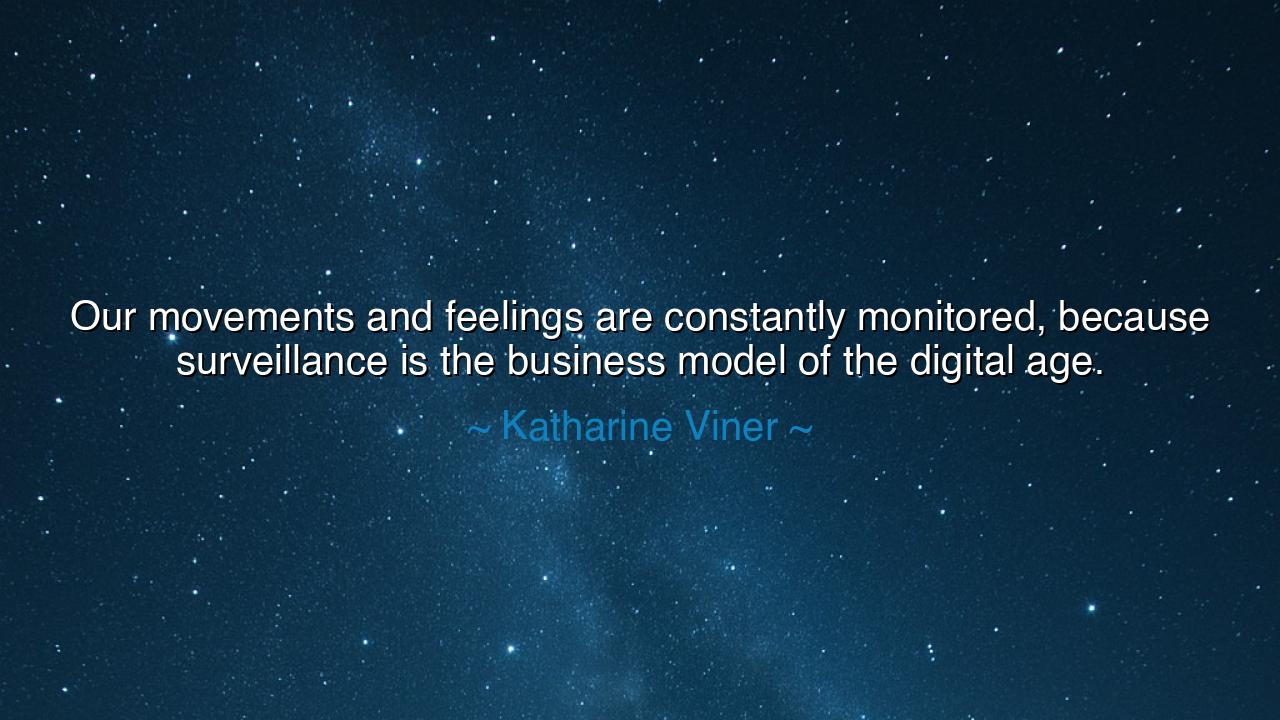
Our movements and feelings are constantly monitored, because
Our movements and feelings are constantly monitored, because surveillance is the business model of the digital age.






"Our movements and feelings are constantly monitored, because surveillance is the business model of the digital age." — Katharine Viner
In these words, Katharine Viner captures a sobering truth about the modern world—a world where surveillance is no longer an isolated tool of governments and institutions, but the very foundation upon which much of the digital economy is built. Our movements, our interactions, and even our emotions are constantly tracked, analyzed, and monetized. The digital age, which promised greater connection, has instead led to a kind of quiet domination, where every click, every search, every like, and every word shared feeds a vast system of observation. This system, ever-expanding and insidious, turns us into both products and participants in an endless cycle of surveillance.
In the past, the watchful eye was a symbol of power and control, most famously embodied in Big Brother from George Orwell's 1984. Yet, in the ancient world, surveillance was not a technology but a practice rooted in power dynamics and control. The Roman Empire, with its vast legions, was one of the first to understand the value of monitoring its citizens, though it was not through technology but through physical presence. The Emperor, ever vigilant, kept a keen eye on his subjects to ensure that no rebellion, no disorder, would rise within the empire. In that time, surveillance was an overt tool of oppression, often used by rulers to maintain order by quelling any hint of dissent. Today, however, surveillance has become more subtle, more integrated into the fabric of our everyday lives. It is no longer about control through force but control through data—invisibly tracking our every movement, thought, and interaction.
Consider the great story of Julius Caesar, who, understanding the need for total control, famously crossed the Rubicon, declaring that the fate of Rome lay in his hands. His ambition was matched by his understanding of how to monitor the pulse of the empire, from the decisions of his generals to the whispers in the streets. His surveillance was direct, the use of informants and legions of soldiers ensuring his power was never threatened. But this form of power was direct, visible, and could be challenged. In the digital age, however, the power of surveillance is invisible, a quiet undercurrent that shapes our actions without us even knowing it, until we are already entangled.
The digital economy has transformed surveillance into a business model, where companies profit not by selling tangible goods, but by collecting and selling our most intimate data. We have become both the product and the consumer. Facebook, Google, Amazon—these are not just platforms for connection, commerce, or information, they are vast machines of observation. Every action we take online, every click, every conversation, and every preference is watched and analyzed to build an ever-more accurate profile of who we are. And this data is not merely stored for security purposes—it is sold, marketed, and used to influence us, shaping not only our choices but also our very thoughts and desires.
The great lesson of history has always been the importance of freedom—freedom of expression, freedom of movement, and freedom from the watchful eye of authority. Yet, in the digital age, freedom has become a commodity, bought and sold in exchange for our personal information. Surveillance has infiltrated every aspect of our lives, eroding the very essence of freedom that we once held dear. In ancient Greece, the philosopher Socrates warned of the dangers of living a life devoid of self-awareness—where individuals become so enmeshed in the systems around them that they lose sight of who they truly are. Today, surveillance works in much the same way, manipulating our actions and perceptions in ways we cannot always see, leading us to question not just our privacy, but our very autonomy.
What, then, is the practical lesson we must take from these revelations? We must, first and foremost, reclaim our autonomy, recognizing that our movements and thoughts are being tracked in ways that we cannot even fully comprehend. The digital world, for all its promise of connection, has created a system of constant observation. The first step in taking back control is awareness—recognizing how our data is being used and by whom. We must demand transparency, and we must seek ways to protect our privacy, even in a world that seems to be built on the erosion of it.
Finally, let us take action—not merely by changing our habits online but by advocating for a world where privacy and freedom are not luxuries but basic human rights. The lessons of the ancients, from Socrates to Caesar, remind us that power, when unchecked, corrupts; that surveillance, when left to those who profit from it, diminishes the human spirit. Let us choose a future where we can live freely, where our thoughts and actions are our own, and where the digital age serves not as a tool of control but as a means of connection, creativity, and autonomy.






AAdministratorAdministrator
Welcome, honored guests. Please leave a comment, we will respond soon